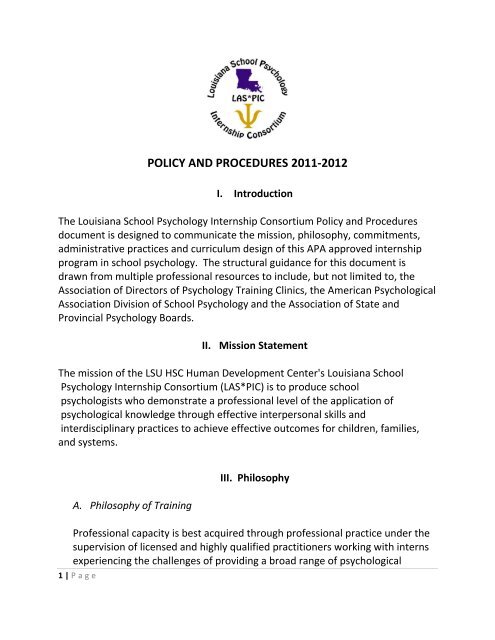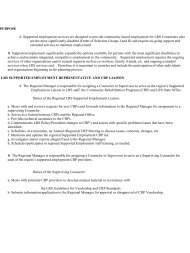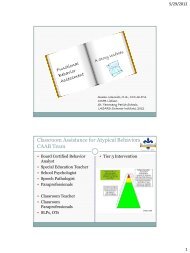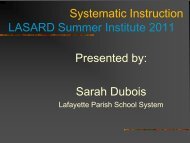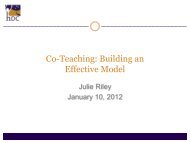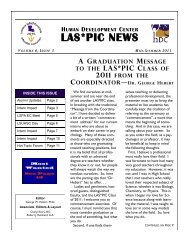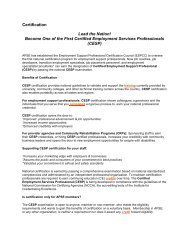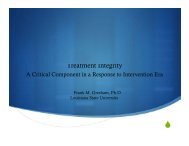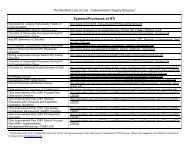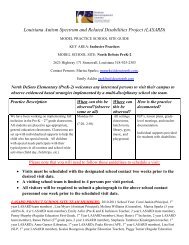louisiana school psychology - LSUHSC Human Development Center
louisiana school psychology - LSUHSC Human Development Center
louisiana school psychology - LSUHSC Human Development Center
You also want an ePaper? Increase the reach of your titles
YUMPU automatically turns print PDFs into web optimized ePapers that Google loves.
POLICY AND PROCEDURES 2011-2012<br />
I. Introduction<br />
The Louisiana School Psychology Internship Consortium Policy and Procedures<br />
document is designed to communicate the mission, philosophy, commitments,<br />
administrative practices and curriculum design of this APA approved internship<br />
program in <strong>school</strong> <strong>psychology</strong>. The structural guidance for this document is<br />
drawn from multiple professional resources to include, but not limited to, the<br />
Association of Directors of Psychology Training Clinics, the American Psychological<br />
Association Division of School Psychology and the Association of State and<br />
Provincial Psychology Boards.<br />
II. Mission Statement<br />
The mission of the LSU HSC <strong>Human</strong> <strong>Development</strong> <strong>Center</strong>'s Louisiana School<br />
Psychology Internship Consortium (LAS*PIC) is to produce <strong>school</strong><br />
psychologists who demonstrate a professional level of the application of<br />
psychological knowledge through effective interpersonal skills and<br />
interdisciplinary practices to achieve effective outcomes for children, families,<br />
and systems.<br />
A. Philosophy of Training<br />
1 | P a g e<br />
III. Philosophy<br />
Professional capacity is best acquired through professional practice under the<br />
supervision of licensed and highly qualified practitioners working with interns<br />
experiencing the challenges of providing a broad range of psychological
services to diverse populations in public <strong>school</strong> settings. High quality training<br />
is inspired by the belief that knowledge from experience will form skills that<br />
when applied can make significant changes for students, families and<br />
educational professionals. An intern curriculum is most effective when<br />
research, experiential curricula and didactic instruction are combined to move<br />
the intern’s considerable knowledgebase to the level of professional<br />
application. Professional preparation requires a commitment to lifelong<br />
learning as today’s solutions may be inadequate for tomorrow’s problems,<br />
thus innovation and the interpersonal capacity to build acceptance for creative<br />
solutions that foster positive change, are valued training outcomes.<br />
B. Philosophy of Supervision<br />
Professional supervision is a powerful teaching relationship between an<br />
accomplished professional and a graduate student in the final phase of their<br />
graduate training. The match of intern to supervisor is, ideally, based upon the<br />
training venue/assignment, the professional expertise of the supervisor, the<br />
intern’s training background and interpersonal compatibility. Essential to the<br />
teaching relationship is the assessment of the intern’s professional capacity.<br />
The assessment of an intern’s professional capacity is formative and<br />
summative. A successful intern will complete a variety of professional<br />
assignments and sustain professional quality performance across the scope of<br />
their assigned responsibilities, as evaluated by their professional and<br />
administrative supervisors.<br />
Telesupervision or the supervision of psychological services through a<br />
synchronous audio and video format is allowed if done in accordance with the<br />
Guidelines and Principles set forth by the American Psychological Association.<br />
Telesupervision should only be utilized when in-person supervision is not<br />
possible. This form of supervision is regarded as consistent with LAS*PIC's<br />
overall model of training in that it best approximates the in-person format of<br />
supervision and can ensure continuity in the supervisory experience. All<br />
trainees can participate in telesupervision, unless certain conditions would<br />
make it impractical. The off-site supervisor keeps the full professional<br />
responsibility for the cases under the care of the intern unless arrangements<br />
are made with at least one other licensed psychologist to cover for non-<br />
2 | P a g e
scheduled consultations and emergencies. Arrangements must be made by<br />
both the intern and supervising psychologist to assure both privacy and<br />
confidentiality for both the client and trainee. Finally, telesupervision can only<br />
be viewed as a legitimate form of supervision if it is determined by both the<br />
professional supervisor and the intern that both the audio and video quality of<br />
the connection is adequate for the proper conduction of supervision.<br />
C. Philosophy of Recruitment<br />
The science and practice of <strong>school</strong> <strong>psychology</strong> is best served by professionals<br />
that represent a broad scope of cultural experience, economic background and<br />
ethnicity. Recruitment is a competitive process from the perspective of the<br />
applicant and the internship program. Competent recruitment efforts are<br />
most efficient in an atmosphere of professional transparency and trust.<br />
Recruiting programs recognize the importance of their commitment to the<br />
intern applicant and the intern applicant’s need for assurance in this important<br />
phase of their education, thus reciprocal “good faith” is essential to the match<br />
process. The practice of professional <strong>school</strong> <strong>psychology</strong> is furthered by<br />
internship programs attracting and recruiting the most qualified candidates.<br />
To this end, the program has a Diversity Committee which should consist of at<br />
least three members. This committee should meet at least once each<br />
academic year so that it may fulfill its charge of the following:<br />
(1) Advice towards Policy and Procedure;<br />
(2) Advice towards Curriculum;<br />
(3) Delivery of at least one Diversity Didactic Seminar<br />
The goals of these efforts are to continually attract and recruit both diverse<br />
interns and staff.<br />
A. Commitment to Ethical Practice<br />
IV. Commitments<br />
We are committed to a high standard of professional behavior for staff and<br />
interns, guided by the American Psychological Association’s 2002 publication<br />
3 | P a g e
Ethical principles of psychologists and code of conduct, communicated<br />
through our internal publications and affirmed through our choices reflected<br />
by our professional behavior. Our commitment to ethical practice is a tool of<br />
intern instruction and professional preparation, in that professional behavior is<br />
most often practiced in the manor of one’s personal experience.<br />
B. Commitment to Excellence in Professional Training<br />
We are committed to excellence in professional training through the delivery<br />
of a powerful curriculum experience of expert <strong>school</strong> <strong>psychology</strong> supervision<br />
of professional practice in <strong>school</strong> settings, supported by didactic instruction<br />
and interdisciplinary training. This professional training program is designed to<br />
enable and empower interns to become effective and contributing members<br />
of their professional community. Our commitment to excellence is confirmed<br />
by the professional success of our many graduates.<br />
C. Commitment to Interdisciplinary and Transdisciplinary Practices<br />
We are committed to interdisciplinary training and transdisciplinary practices<br />
as indispensible professional skills for <strong>school</strong> psychologists to meet the<br />
complex demands of <strong>school</strong> <strong>psychology</strong> consumers today and in the future.<br />
Interdisciplinary collaborative practices and transdisciplinary practices are<br />
behaviors reflective of a mature professional with refined interpersonal skills<br />
and confident professional judgment necessary for a successful professional<br />
career in <strong>school</strong> <strong>psychology</strong>. Our commitment to interdisciplinary and<br />
transdisciplinary practices improves the quality of critical decisions for<br />
children, families and <strong>school</strong>s systems served by our interns.<br />
D. Commitment to Cultural Competence<br />
We are committed to educating culturally competent interns to sustain this<br />
significant interpersonal and professional attribute in the professional <strong>school</strong><br />
<strong>psychology</strong> community for the benefit of all students and all families. Cultural<br />
competence is essential to the skill set of the professional <strong>school</strong> psychologist,<br />
4 | P a g e
without regard to the area of the country in which they are to be employed,<br />
the population density of their community or the transitory nature of the<br />
citizens. As the appellation “core culture” becomes less descriptively relevant,<br />
<strong>school</strong>s will become a more complex mix of cultures requiring a higher level of<br />
interpersonal sophistication. Our commitment cultural competence builds<br />
valuable interpersonal skills for the professional <strong>school</strong> psychologist.<br />
E. Commitment to Diversity of Culture and Individual Difference<br />
We are committed to diversity of culture and individual difference in our<br />
faculty, staff and intern population. A culturally competent program embraces<br />
the scope of the human experience and promotes equity for all persons<br />
preparing for a future bounded only by creativity, ability and effort. The<br />
location of our program in New Orleans sets the stage for a most diverse<br />
cultural experience, in a community that celebrates individual difference. Our<br />
commitment to diversity of culture and individual difference is seen in who we<br />
are and who our interns are. LAS*PIC has a diversity committee which is<br />
charged with advising policy for the internship; advising curriculum content for<br />
the internship; and to provide trainings to the interns regarding diversity.<br />
F. Commitment to Public Disclosure<br />
We are committed to transparent administrative practice, with rigorous<br />
oversight through public disclosure of our budget, research,<br />
policies/procedures and outcomes. Our program was approved by the<br />
American Psychological Association following an exhaustive review and has<br />
been subsequently reviewed for continuation of our status as an APA<br />
approved internship program. The findings of such in-depth analysis are made<br />
available to our sponsors, stakeholders and associates. Our commitment to<br />
public disclosure achieves an operational transparency that reinforces the<br />
trust relationship with our host university, our stakeholders and our interns.<br />
G. Commitment to Community Benefit<br />
5 | P a g e
We are committed to creating achievements for the benefit of our regional<br />
community and the larger community of education consumers. Through our<br />
network of stakeholders, representing the regional community, we provide a<br />
high level of direct professional assistance to <strong>school</strong> systems with staff,<br />
specialized training, continuing professional education and we serve as<br />
resource to families seeking information about specific issues regarding special<br />
education services. Our commitment to community benefit is evident in our<br />
relationships with stakeholders and over a decade of local, state and national<br />
recognition for our contributions to excellence in education for all students.<br />
V. Administration<br />
A. Administrative Personnel Roles and Responsibilities<br />
1. Director/Chief Psychologist. The director and chief psychologist of the<br />
LAS*PIC must be a Louisiana licensed psychologist trained specifically as a<br />
<strong>school</strong> psychologist. This person is responsible for the negotiation of<br />
resources within the <strong>Human</strong> <strong>Development</strong> <strong>Center</strong> as well as seeking funding<br />
partnerships with outside agencies. Additionally, the director ensures that all<br />
activities are consistent with the mission of the American Psychological<br />
Association (APA) and the Association of Postdoctoral and Internship <strong>Center</strong>s<br />
(APPIC). Finally, the Director has the role of chief psychologist in which he or<br />
she assumes the role of final arbiter when problem solving with professional<br />
supervisors becomes necessary. Additional institutional responsibilities are<br />
required for this position.<br />
2. Coordinator. The coordinator must be either a nationally/state certified<br />
<strong>school</strong> psychologist or a licensed psychologist with specialized training in<br />
<strong>school</strong> <strong>psychology</strong>. This person is responsible for the day to day activities<br />
surrounding the running of the program. It is the responsibility of the<br />
coordinator to plan the curriculum, monitor the progress of each intern, plan<br />
and conduct interviews for future classes, and problem solve issues with the<br />
professional supervisors. The coordinator reports directly to the<br />
Director/Chief Psychologist. Additional institutional responsibilities are<br />
required for this position.<br />
6 | P a g e
B. Support Staff Roles and Responsibilities<br />
1. Research Associate. The research associate must possess at the very<br />
minimum a bachelor’s degree. This person is responsible for maintaining all of<br />
the records associated with the LAS*PIC. The research associate maintains the<br />
data bases, monitors the interns’ compliance with program requirements,<br />
assists with the general running of the program, and participates in problem<br />
solving with others when the need arises. The research associate reports<br />
directly to the coordinator. Additional institutional responsibilities are<br />
required for this position.<br />
C. Contract Employees<br />
The broad scope of expertise required to deliver a quality internship program<br />
will require LAS*PIC to seek and employee persons with special experience,<br />
unique skills and valuable knowledge, for specific assignments. It is cost<br />
effective to employee such persons on a temporal basis without any obligation<br />
for a continuing professional association, beyond the terms and length of their<br />
specific contract. Contract employees serve at the discretion of the LAS*PIC<br />
Director, with the approval of the Department Head for the Louisiana State<br />
University Health Sciences <strong>Center</strong>, <strong>Human</strong> <strong>Development</strong> <strong>Center</strong>. All persons<br />
employed under contract with LAS*PIC are expected to comply with the<br />
policies of the <strong>LSUHSC</strong>—HDC and LAS*PIC policies and procedures in the<br />
conduct of their professional assignments.<br />
D. Consortium Resources<br />
The LAS*PIC is housed in the <strong>Human</strong> <strong>Development</strong> <strong>Center</strong> (HDC) in the School<br />
of Allied Health Professions of the LSU Health Sciences <strong>Center</strong>. Although some<br />
money for operating expenses is received from the State Department of<br />
Education, much of the costs are absorbed by the HDC. Additionally, grant<br />
money may be used to support the mission and activities of the LAS*PIC.<br />
Finally, the HDC provides office space for all of the personnel, meeting space<br />
7 | P a g e
for trainings and business, administrative support, and an entire infrastructure<br />
to support and strengthen the program.<br />
E. Operational Guidelines<br />
1. Infrastructure and Support: LAS*PIC is a program of the <strong>Human</strong><br />
<strong>Development</strong> <strong>Center</strong> (HDC) within the Louisiana State University Health<br />
Sciences <strong>Center</strong> (<strong>LSUHSC</strong>). LAS*PIC receives its funding from Louisiana<br />
Department of Education grants and Louisiana State University Health<br />
Sciences <strong>Center</strong>, <strong>Human</strong> <strong>Development</strong> <strong>Center</strong>. Training venues include the<br />
HSC, <strong>school</strong>s under the administration of the local <strong>school</strong> districts and other<br />
rotation sites chosen by LAS*PIC. The LAS*PIC Director and Coordinator have<br />
adequate time in their assignments with <strong>LSUHSC</strong>-HDC to adequately<br />
administer the program, provide oversight and creative direction to the<br />
training experience of the interns.<br />
2. Policies and Procedures: LASPIC policies and procedures are found in a<br />
document titled LOUISIANA SCHOOL PSYCHOLOGY INTERNSHIP<br />
CONSORTIUM LAS*PIC POLICY AND PROCEDURES and in the LAS*PIC<br />
Handbook. These documents are annually reviewed by LAS*PIC<br />
administration, stake holders, external program evaluator and an intern<br />
representative. Both documents are updated following a final review by the<br />
Director.<br />
3. Staff Training and Confidentiality: The LAS*PIC staff are trained in the<br />
policies and procedures of LAS*PIC. Staff are further trained in the ethical<br />
guidelines and confidentiality issues significant to their roles and<br />
responsibilities. LAS*PIC administrator, administrative assistants and those<br />
charged with the responsibility of maintaining intern records are trained in<br />
the Family Educational Rights and Privacy Act (FERPA) and follow the<br />
requirements of this act in the handling of intern records.<br />
4. LASPIC Operations: LAS*PIC interns provide services to students, families<br />
and educational professionals through local <strong>school</strong> districts that are<br />
stakeholders in the LAS*PIC consortium and matched to interns through the<br />
APPIC process. Continuity of service to students is insured on an annual basis<br />
8 | P a g e
as interns are contracted for a period of one <strong>school</strong> year, although their<br />
training contract is for a period of twelve months. Interns professional<br />
responsibilities are subject to the <strong>school</strong> district to which they are assigned,<br />
yet governed by the LAS*PIC Handbook. Each intern is given a copy of the<br />
LAS*PIC Handbook and receives instruction in this handbook during<br />
orientation at the start of the internship year.<br />
5. Billing and Financial Issues: LAS*PIC interns are not assigned, generally, to<br />
sites that are fee for service operations; however, some interns may enter<br />
LAS*PIC as a Nationally Certified School Psychologists and/or with Louisiana<br />
Certification/Licensure, thus potentially eligible to bill through various<br />
state/federal programs. Such billing is a site specific issue to be limited by<br />
the intern’s professional supervisor and the LAS*PIC Director. Interns placed<br />
in a professional environment where there is billing for professional services<br />
with prior professional supervisor and LAS*PIC Director approval, must abide<br />
by all pertinent HIPAA regulations. LAS*PIC does not actively seek or avoid<br />
professional associations with public sector intern sites that bill for services,<br />
but does reserve the right to approve the billable professional participation<br />
of any intern under LAS*PIC supervision. LAS*PIC is not a billing entity.<br />
6. Informed Consent: Informed consent is a mandate of state and federal<br />
policy, yet <strong>school</strong> districts are required by LAS*PIC to identify all such<br />
documents that affirm consent for services from an intern, to reflect that<br />
services are being provided by a <strong>school</strong> <strong>psychology</strong> intern under supervision<br />
by a Louisiana Licensed Psychologist or Certified School Psychologist,<br />
identified by name in the document. Parents/guardians are instructed that<br />
they may contact the intern’s professional supervisor regarding services<br />
provided by an intern under supervision.<br />
7. Crisis Care and Emergency Policies: LAS*PIC interns may be called upon to<br />
provide crisis intervention services within the scope of their training while<br />
providing a district with full range <strong>school</strong> <strong>psychology</strong> services. Each district<br />
may have a unique crisis plan and each may provide differing levels of crisis<br />
services to students; however, interns practice within the limits of their<br />
training and are to access professional supervision as needed. Each intern is<br />
to have an emergency number for their professional supervisor and a<br />
9 | P a g e
system/procedure to alert their individual supervisor of an urgent situation<br />
that would require an immediate response. Professional supervisors<br />
recognize that interns responding to crisis situations in <strong>school</strong>s may need<br />
direct supervision and are fully prepared and willing to provide such support<br />
consistent with a prearranged method of emergency contact. It is<br />
understood that such support would typically be by phone, rather than<br />
onsite, and thus other community emergency resources would be utilized if<br />
the circumstances exceeded the capacity of the <strong>school</strong> to respond<br />
appropriately to the student in crisis.<br />
8. Integration of Ethics and Cultural Competence Training: Embedded in<br />
LAS*PIC’s experiential training and through explicit instruction, interns<br />
become competent in decision making models that rely upon ethical<br />
practices and cultural sensitivity. Interns practice consultation, assessment<br />
and intervention under supervision that supports decision making with a<br />
mature understanding of the diversity and multi-cultural needs of students<br />
and families in <strong>school</strong> settings, consistent with “Guidelines on Multicultural<br />
Education, Training, Research, Practice and Organizational Change for<br />
Psychologist” APA, 2003. Didactic training is enhanced by situation specific<br />
supervision of learning experiences that challenge the intern’s practical<br />
application of culture-centered responsiveness to issues involving students<br />
that are racially, culturally and linguistically different, in public <strong>school</strong>s and<br />
other educational settings.<br />
9. Collaborative and Evidence-based Practice: We recognize families and<br />
students as essential participants in the collaborative process of educational<br />
assessment and intervention. Interns are taught that it is incumbent upon the<br />
<strong>school</strong> psychologist to inform and educate stakeholders regarding assessments<br />
and interventions proposed as an expectation of informed consent.<br />
Additionally, interns are trained to evaluate intervention methodologies to<br />
select and utilize the most appropriate empirically-supported interventions<br />
indicated, a practice consistent with the “Report of the 2005 Presidential Task<br />
Force on Evidence-Based Practice” APA, 2005. Interns are prepared through<br />
didactic and experiential training to respond to the demands of best practice,<br />
professional accountability in the workplace and in the event of legal<br />
challenges to professional judgment, through evidence-based practices.<br />
10 | P a g e
10. Documentation and Record Keeping: Professional Supervisors and local<br />
educational agencies establish the parameters for documentation and record<br />
keeping for professional services provided by <strong>school</strong> <strong>psychology</strong> interns. The<br />
intern’s professional identity on all manner of student records,<br />
correspondence, case notes and reports is to be shown as “School<br />
Psychology Intern” and must also identify the name of the intern’s<br />
professional supervisor. Interns in possession of protected health<br />
information regarding students and families are held to the same standard as<br />
all treating professionals in the transportation, on-site use and destruction of<br />
confidential professional documents. Interns are advised to report<br />
immediately lost confidential documents/records or compromised<br />
confidential information to their employing district and to their professional<br />
supervisor.<br />
11. HIPAA: LAS*PIC does not collect, store or electronically transmit personal<br />
health information on persons served by LAS*PIC interns. Adherence to<br />
HIPAA requirements are the responsibility of the local educational agency<br />
and its employees. Interns as employees of local educational agencies are<br />
responsible for knowledge of and compliancy with all HIPAA requirements<br />
for public <strong>school</strong>s. Interns are instructed to report any personal violations of<br />
HIPAA confidentiality standards to the <strong>school</strong> district’s HIPAA Confidentiality<br />
Coordinator and their professional supervisor.<br />
12. Financial Accountability and Service Expectations: LASPIC is not a financially<br />
self-sustaining, fee for service intern training program that bills for<br />
professional services rendered.<br />
13. Problem Resolution and Due Process: Problem resolution and due process<br />
represent two distinct processes, but may overlap if warranted by facts and<br />
circumstances, at the discretion of the LASPIC Director. Problem resolution is<br />
the addressing of a grievance and due process in a structured administrative<br />
procedure to address the action(s) of an intern that can lead to remedial<br />
requirements or termination of internship and separation from the program.<br />
Grievances may be resolved through an informal or a formal process as<br />
11 | P a g e
outlined in the LASPIC Intern Handbook (see Appendix A). All interns sign<br />
that they have received a copy of the LASPIC Intern Handbook and the Policy<br />
and Procedures Document that covers this process and understands the<br />
grievance procedures, the due process requirements, the responsibilities of<br />
the intern and the responsibilities of LASPIC prior to beginning the program.<br />
Unprofessional conduct, violation of LASPIC policy, ethical violations and<br />
inadequate progress (there is no provision for partial credit; completion of<br />
the program requires completion of the entire program—see LAS*PIC<br />
Intern Handbook) in the curriculum may result in a formal hearing of the<br />
issue to determine a proportionate course of action that may include<br />
determination of “no finding”, a plan of remediation or termination of<br />
internship with separation from LASPIC. Severe ethical violations, other<br />
very serious breaches of professional conduct and/or criminal behavior will<br />
be cause for immediate removal from the program.<br />
A due process action is for substantive matters and is a responsibility that<br />
LAS*PIC takes quite seriously. To ensure full disclosure of how LAS*PIC<br />
interprets its obligation to provide a fundamentally fair administrative<br />
process, this procedural guide is provided:<br />
LAS*PIC Due Process Procedural Guide<br />
a.) Allegations are received by LAS*PIC Coordinator/Director.<br />
b.) Allegations are investigated and a determined to be substantive.<br />
c.) The intern is advised of the allegations.<br />
d.) The allegations are provided to the intern in a detailed document<br />
showing the intern the specific violation of conduct alleged.<br />
e.) The intern is given an opportunity to rebut the allegations in a timely<br />
hearing on the matter. The LAS*PIC Coordinator/Director must be a<br />
member of the hearing committee. The hearing committee must have<br />
three members.<br />
f.) LAS*PIC must produce substantial evidence to show that a specific<br />
violation occurred. Evidence presented must be of such a quality as<br />
stand up to careful scrutiny.<br />
12 | P a g e
g.) Any finding that requires a corrective action on the part of the intern or<br />
results in the termination of internship with separation from LAS*PIC<br />
must be accompanied by an explanation of the finding and the basis for<br />
the action taken.<br />
h.) All evidence, statements, correspondence and findings of a due process<br />
hearing are to be held to the strictest standards of professional<br />
confidentiality.<br />
F. Supervision:<br />
LASPIC supervisors are licensed and/or certified by the state of Louisiana and<br />
are qualified to practice in the areas in which the supervise LASPIC interns, as<br />
verified by LASPIC administrative staff. Should a supervisor become ineligible<br />
to provide supervision during the course of an intern’s supervision, that<br />
supervisor’s relationship with LASPIC will be terminated and a new supervisor<br />
assigned. All LASPIC supervisors and interns commit to adherence to the APA<br />
Ethical Principles and Code of Conduct. LASPIC’s administrative policy provides<br />
oversight to insure that supervisors are competent, appropriately credentialed<br />
and qualified by training and experience to provide supervision to pre-doctoral<br />
interns. Supervisors develop their individual written memoranda of<br />
understanding with the interns that they supervise to define the scope of<br />
supervision and mutual responsibilities. It is the responsibility of the<br />
supervisor to provide supervision commensurate with the professional<br />
competence of the intern and significant to intern’s assignment<br />
responsibilities. Documentation of intern supervision is kept individually in<br />
each interns LASPIC training file [insert appendix]. Interns are each given a<br />
copy of the LASPIC Handbook that describes the supervision component of<br />
their internship. This description covers, but is not limited to, the supervisory<br />
relationship, feedback, time requirements, intern evaluations, intern ratings of<br />
supervisors and confidentiality of the evaluation process [insert appendix].<br />
Supervisors are evaluated annually by the LASPIC Director [insert appendix].<br />
G. Professional Relationships:<br />
LAS*PIC has established and sustains a professional training atmosphere that<br />
acculturates interns to the applied world of <strong>school</strong> <strong>psychology</strong>, while<br />
13 | P a g e
connected to an academically demanding university setting and under<br />
professional supervision. The natural tension that is present between the<br />
demands of applied settings and the expectations created by university<br />
training, present instructive moments that can challenge the rational<br />
detachment of even the most seasoned professional. All staff and interns are<br />
to adhere to the “Ethical Principles of Psychologists and Code of Conduct” APA<br />
June 2003, as professional conduct that exemplifies the highest standards of<br />
the profession are performance benchmarks for staff, supervisors and interns.<br />
Interns are informed of LAS*PIC’s expectation for professional conduct during<br />
admission, and further advised of the procedures that govern acts of<br />
misconduct and grievances. Additionally, interns are informed by a quarterly<br />
performance assessment of their progress/growth in this area of professional<br />
development.<br />
H. Program Self-Assessment and Quality Enhancement:<br />
LAS*PIC cultivates program quality through self-assessment to identify<br />
programmatic alignment with the current status of innovation in state of the<br />
art professional practice, the needs of stakeholders/consumers, current<br />
regulatory trends and university expectations for quality internship training.<br />
Self-assessment has an evaluative and aspirational component in that the<br />
questions to be answered are “How well have we delivered our program?” and<br />
“What could we do to improve the quality of our internship training<br />
experience?” Multifaceted internal evaluation is data rich from intern<br />
feedback, staff debriefing sessions, routine stakeholder forums and close ties<br />
with numerous training programs to provide perspective as to successful<br />
training practices within the <strong>school</strong> <strong>psychology</strong> training community. This<br />
formal and informal data set is used in conjunction with a third party review of<br />
program (See External Review) to enhance the quality of professional training<br />
for LAS*PIC interns.<br />
I. External Review:<br />
LAS*PIC, independent of any requirement from a governing body or affiliated<br />
agency, supports an independent external review of its policy, procedures and<br />
program. This review is conducted by a party external to LAS*PIC and given<br />
14 | P a g e
unfettered access to administrative, policy and curriculum documents. This<br />
process typically includes detailed surveys and/or interviews with staff,<br />
stakeholders and interns. A report with recommendations is submitted to the<br />
LAS*PIC Director at mid-year and at the end of the internship year. Findings of<br />
the external reviewer are made available to interns, staff and stakeholders.<br />
Additionally, the external review findings are used to further assess the status<br />
of program progress, policy revision considerations, administrative capacities,<br />
admission policy, strengths/limitations and curriculum.<br />
A. Didactic<br />
VI. Curriculum Design<br />
Using an advanced seminar format, interns typically receive instruction one<br />
day per month. The general format begins with an introductory activity related<br />
to the seminar topic. Then the instruction is conducted either by the<br />
coordinator or a guest. Information is presented, questions elicited and<br />
answered and practical application of the information is discussed. Many times<br />
interns will be asked to break up into smaller groups to better process and<br />
discuss the matter (as peer supervision) .<br />
B. Experiential<br />
1. Field Placement: Interns will spend roughly four days (Tuesday –<br />
Friday) per week in their <strong>school</strong> district. Much of the learning<br />
experience stems from these authentic <strong>school</strong> <strong>psychology</strong><br />
experiences, especially as they are processed in supervision. In<br />
their respective <strong>school</strong> placements, interns serve on many teams.<br />
They generally serve on a pupil appraisal team as well as various<br />
intervention teams in the <strong>school</strong>s from which referrals are<br />
received.<br />
2. Interdisciplinary Collaborative Practice/Transdisciplinary Practice:<br />
The LAS*PIC curriculum recognizes Interdisciplinary Collaborative<br />
Practice/Transdisciplinary Practice (IDCP/TDP) as a standard of<br />
15 | P a g e
quality professional training and a fundamental skill set for a<br />
mature professional. LAS*PIC prepares interns with didactic and<br />
experiential instruction in IDCP and TDP significant to the practice<br />
of professional <strong>school</strong> <strong>psychology</strong> and other related professional<br />
applications. The design of this curriculum element has three<br />
primary instructional components: a.) Onsite seminar based<br />
instruction by professional staff, experienced in the training and<br />
supervision of graduate and post-graduate students in<br />
interdisciplinary professional practices as applied in <strong>school</strong>s,<br />
clinics, hospitals and/or residential facilities. b.) Field placements<br />
with public <strong>school</strong> districts that implement various models of<br />
interdisciplinary practice as a standard decision making format to<br />
determine educational diagnoses, instructional/treatment<br />
planning, intervention and in rare cases, recommendation of<br />
institutional care. c.) Targeted experiences across a variety of<br />
decision making venues that are not typical to public <strong>school</strong><br />
settings, yet provide the intern with experience in decision<br />
models applied in medical, quasi-medical, re-habilitative,<br />
legal/court and mental health settings that require the unique<br />
behavioral and educational expertise of <strong>school</strong> psychologists.<br />
Transdisciplinary practice is an advancement of Interdisciplinary<br />
Collaborative Practices that requires the skillful cultivation of<br />
team trust and cohesion that leads to shared responsibility for the<br />
execution of a team plan and shared accountability for outcomes.<br />
Team members educate one another as to their area of expertise,<br />
to achieve skills that may be practiced with supervision from the<br />
responsible party and support for critical needs or to satisfy<br />
regulatory obligations (interns in training must always be under<br />
direct supervision within any area of external/additional training).<br />
LAS*PIC prepares interns to recognize and act upon professional<br />
opportunities to advance Interdisciplinary Collaborative Practices<br />
to Transdisciplinary Team building with clinical abilities sustained<br />
by professional interpersonal technique.<br />
3. Summer Rotations: All interns who signed a ten-month contract<br />
with their LEA will also choose a summer rotation. Rather than<br />
16 | P a g e
working in their LEA’s , the intern will work four days each week in<br />
their summer rotation. This summer rotation, similar to the<br />
spring rotation, should be selected after careful discussion has<br />
occurred between the intern and professional supervisor.<br />
Consideration of unmet needs or interests in new knowledge or<br />
skills should drive the selection of the summer rotation.<br />
Curriculum Outline:<br />
I. Philosophy and Vocabulary of IDCP<br />
II. Understanding Organizations from the Perspective of Power<br />
III. Changing Entrenched Practices and Habits<br />
IV. Using the Vocabulary of IDCP as an Interpersonal Teaching<br />
Tool<br />
V. Overcoming Barriers as you Build<br />
VI. The Value of Each Team Member: Beyond Personal Talent to<br />
the Power the Team<br />
VII. Techniques for Application and Evaluation<br />
VIII. Advanced Skills: Building Transdisciplinary Teams<br />
C. Competency Measures (Formative and Summative)<br />
At the end of each quarter, each intern is rated by their professional<br />
supervisor on an objective measure, which exhaustively assesses the general<br />
competencies of a model <strong>school</strong> psychologist which includes personal<br />
characteristics, assessment skills, consultation skills, intervention skills, and<br />
professional conduct. Additionally, competency across all training settings<br />
may be assessed by evaluation of the intern’s response to problem solving<br />
strategies that may be implemented in special situations. Poor quarterly<br />
ratings or a poor evaluation of an intern’s response to corrective strategies<br />
could result in an unsuccessful internship or failure. (See Section V.E.13)<br />
17 | P a g e
18 | P a g e


